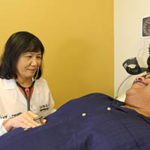UCF College of Medicine researchers have found an enzyme that cuts away the building blocks that form the brain plaques linked to Alzheimer’s disease. Scientists believe the buildup of that plaque is what causes the disease’s devastating symptoms of cognitive decline, dementia, and memory loss.

Worldwide, an estimated 44 million people suffer from Alzheimer’s – including 1 in 10 people, ages 65 or older, in the United States. As scientists seek to find a cure, they are focusing on the molecular changes that happen in the aging brain that could cause the disease. They know that the brain’s amyloid precursor protein (APP), responsible for growing and repairing brain cells, also releases amyloid-beta peptides, which, if out of control, can clump together to form Alzheimer’s amyloid plaques.
Dr. Li-Mei Chen and Dr. Karl Chai had earlier discovered that an enzyme called matriptase can cut and disable individual amyloid-beta peptides. Now, they are examining whether matriptase can cut and remove plaques from the brain without damaging surrounding tissues.
“The matriptase enzyme can cut the source protein of amyloid-beta, reduce amyloid-beta production, and potentially clean out amyloid-beta clumps,” said Dr. Chen. “Hopefully, it can cut away the already formed plaques.”
The researchers first discovered the enzyme’s cutting ability in 2011 as part of their efforts to treat breast cancer. Matriptase is found in human milk and has the ability to cut proteins found in breast and many other tumors.
But because their focus was on cancer, not Alzheimer’s, Drs. Chen and Chai didn’t follow up on their discovery until they read another researcher’s paper in 2017. The paper, which appeared in The Journal of Biological Chemistry, discussed the enzyme’s potential uses in Alzheimer’s treatment. That caused the team to revisit their work. They published a short report to inform and seek collaboration with other scientists. This month, they formed a collaboration with the authors of that study, Drs. Richard Leduc and Christine Lavoie at the Université de Sherbrooke in Quebec, Canada.
Although more research is needed, the enzyme appears promising in battling Alzheimer’s disease.
UCF biomedical sciences undergraduate Jonathan Ruiz has been working with the research team since 2018. He said, in the lab, matriptase cut and disabled amyloid-beta clumps in just a few hours.
“To be able to contribute alongside so many other researchers to find new potential ways to fight Alzheimer’s disease has been an amazing experience,” said Ruiz, who plans to attend UCF’s medical school after graduating next summer.
The team published its findings earlier this year in the journal BMC Research Notes. The researchers said the next step will be to test the enzyme on specific cell lines and mouse models to see if “matriptase can selectively cut away plaque-forming proteins and the plaques, without harming the cells in the brain,” Dr. Chen said.
There is no cure for Alzheimer’s, only medications to slow its progression. But those have major side effects, such as nausea, vomiting and loss of appetite.
The UCF researchers are now working to develop immune cells that could deliver matriptase directly to the brain. That treatment could potentially prevent Alzheimer’s and also improve brain function of patients with the disease, they said.


